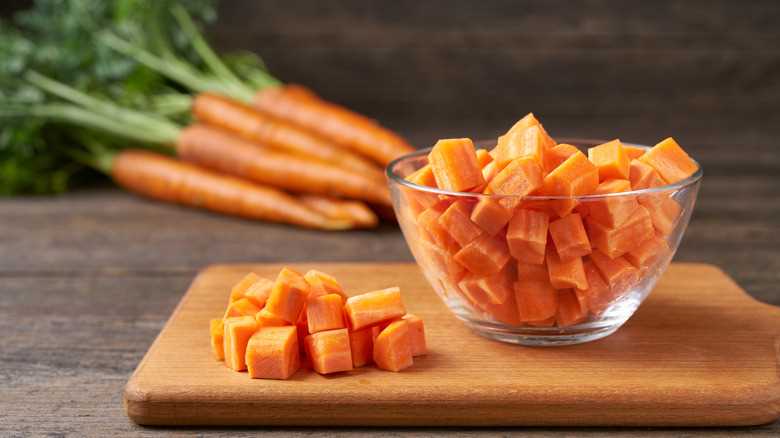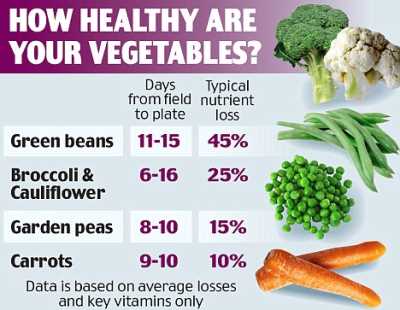





Carrots are nutritious vegetables that are widely consumed around the world. They are packed with essential vitamins and minerals, making them a popular choice for a healthy diet. However, the question often arises whether carrots lose nutrients when cooked.
When carrots are cooked, their texture and taste change, but the overall nutritional content remains largely intact. Cooking methods, such as boiling, steaming, or roasting, can affect the nutrient content of carrots to some extent.
Boiling carrots can lead to a loss of water-soluble vitamins such as vitamin C, as they may leach out into the cooking water. However, since most of the nutrients in carrots are heat-stable, the impact of boiling on overall nutritional value is minimal.
Steaming carrots allows them to retain more of their nutrients compared to boiling. The steaming process helps to preserve the water-soluble vitamins, ensuring that they remain in the carrots instead of being lost in the cooking water. This makes steaming a healthier cooking method for those who want to maximize the nutritional benefits of carrots.
Similarly, roasting carrots can also help to maintain their nutrient content. By baking them in the oven, the carrots retain their natural flavors and nutrients without significant loss. Roasted carrots can be a delicious and nutritious addition to any meal.
In conclusion, while there may be a slight loss of nutrients when cooking carrots, the overall impact is minimal. Choosing steaming or roasting as cooking methods can help to preserve the nutritional value of carrots to a greater extent compared to boiling. So, don’t hesitate to enjoy your cooked carrots as part of a healthy and balanced diet.
The Nutritional Value of Carrots
Carrots are a highly nutritious vegetable that are rich in various vitamins and minerals. They are a good source of vitamin A, vitamin K, vitamin C, and potassium. Carrots also contain small amounts of vitamin B6, dietary fiber, and folate.
One of the key nutrients in carrots is beta-carotene, which is responsible for their vibrant orange color. Beta-carotene is converted into vitamin A in the body, which is essential for good vision, immune function, and cell growth.
Carrots are also high in antioxidants, which help protect the body against damage from harmful free radicals. These antioxidants have been linked to a reduced risk of chronic diseases, such as heart disease and certain types of cancer.
When it comes to cooking carrots, there is some debate about whether they lose nutrients. While cooking carrots can cause some loss of water-soluble vitamins, such as vitamin C, it can also increase the availability of other nutrients. For example, cooking carrots enhances the release of beta-carotene, making it more easily absorbed by the body.
Overall, whether eaten raw or cooked, carrots are a nutritious addition to any diet. They are low in calories and high in nutrients, making them a great choice for maintaining overall health and wellbeing.
Do Carrots Lose Nutrients When Cooked?
Carrots are a popular and nutritious vegetable that can be enjoyed in a variety of ways. One common question that arises when cooking carrots is whether they lose nutrients during the cooking process. While cooking can cause some nutrient loss, it also enhances the availability of certain nutrients, making them easier for our bodies to absorb.
Nutrient Retention
When carrots are cooked, some water-soluble nutrients, such as vitamin C and certain B vitamins, can be lost due to heat and the cooking liquid. However, carrots are still a good source of these vitamins, even when cooked. It’s important to note that the extent of nutrient loss depends on the cooking method and duration.
Steaming or microwaving carrots with minimal water can help minimize nutrient loss compared to boiling, as the cooking time is shorter. Furthermore, keeping the carrot skins intact while cooking can help retain more vitamins, as some nutrients are present in or near the peel. However, peeled or sliced carrots can still provide valuable nutrients, so don’t worry if you prefer them that way!
Nutrient Enhancement
While cooking can lead to nutrient loss, it also enhances the availability of certain nutrients. For example, cooking carrots breaks down their tough cell walls, making it easier for our bodies to access and absorb the beta-carotene present in the vegetable. Beta-carotene, a precursor to vitamin A, is a powerful antioxidant that supports eye health and immune function.
Moreover, cooking carrots with a small amount of fat or oil can increase the absorption of fat-soluble nutrients such as beta-carotene. Adding a little olive oil or butter to your cooked carrots can optimize the nutritional benefits obtained from this versatile vegetable.
In conclusion, while cooking carrots may lead to some nutrient loss, they still retain a significant amount of their nutritional value. So whether you enjoy them raw, steamed, boiled, or roasted, rest assured that carrots can be a valuable addition to a healthy diet.
The Effects of Cooking on Carrot Nutrients

There is often a concern that cooking vegetables, such as carrots, may lead to a loss of nutrients. While it is true that some nutrients are lost during the cooking process, the impact on carrot nutrients is relatively minimal.
One nutrient that can be affected by cooking is vitamin C. Carrots are known for their high vitamin C content, which is an important antioxidant. However, studies have shown that the loss of vitamin C in carrots is relatively small when cooked. In fact, cooking can actually increase the availability of vitamin C in carrots by breaking down the tough cellular structure and making the nutrient more easily absorbed by the body.
Cooking carrots can also enhance the levels of certain carotenoids, which are responsible for the vibrant orange color. Carotenoids, such as beta-carotene, are converted into vitamin A in the body. By cooking carrots, the cell walls are broken down, making it easier for the body to access and absorb these important antioxidants.
Some other nutrients, such as potassium and magnesium, are also retained during the cooking process. However, it is worth noting that cooking methods can affect nutrient retention. For example, boiling carrots may result in a greater nutrient loss compared to steaming or roasting them.
Overall, while cooking can cause some loss of nutrients in carrots, the impact is relatively small. In fact, certain nutrients may even be made more available to the body through cooking. Therefore, incorporating cooked carrots into a balanced diet can still provide a variety of essential nutrients to support overall health.
Retaining Nutrients When Cooking Carrots

Carrots are a nutritious root vegetable, packed with essential vitamins and minerals. Many people wonder if cooking carrots causes them to lose their nutrients. While some nutrients may be lost during the cooking process, there are ways to retain the majority of the important vitamins and minerals.
One key factor in retaining the nutrients in cooked carrots is the method of cooking. Boiling carrots can cause some water-soluble vitamins, such as vitamin C, to leach out into the cooking water. To minimize nutrient loss, it is recommended to cook carrots using methods that require minimal water, such as steaming or microwaving.
It is also important to note that overcooking carrots can further deplete their nutrient content. Carrots should be cooked until they are slightly tender but still retain some crispness. This ensures that they maintain their vitamins and minerals while also offering a pleasant texture.
Additionally, it is beneficial to keep the carrot skins intact while cooking, as many nutrients are concentrated in or just below the skin. If the carrots are rinsed and not peeled before cooking, this helps to preserve their nutrient content.
In summary, while some nutrient loss may occur during the cooking process, it is possible to retain a significant amount of the vitamins and minerals in carrots by employing proper cooking methods. Steaming or microwaving carrots and avoiding overcooking can help to preserve their nutritional value and ensure that they remain a healthy addition to your diet.
Best Cooking Methods for Preserving Carrot Nutrients
When it comes to cooking carrots, there are several methods you can use to preserve their nutrients. While some cooking methods may cause a slight loss of nutrients, others can help enhance the bioavailability of these essential vitamins and minerals.
1. Steaming
Steaming carrots is one of the best cooking methods for preserving their nutrients. This gentle cooking technique helps to retain the water-soluble vitamins, such as vitamin C and the B vitamins, which can be lost in other cooking methods.
2. Roasting
Roasting carrots is another great option to preserve their nutrients. This method involves coating the carrots with a small amount of oil and roasting them in the oven until they become tender and slightly caramelized. Roasting helps to break down the cell walls, making the nutrients more accessible for absorption.
3. Boiling
Boiling carrots can result in some nutrient loss, as the water-soluble vitamins can leach into the cooking water. However, by using as little water as possible and cooking them only until tender-crisp, you can minimize nutrient loss.
To further preserve the nutrients, you can save the cooking water and use it in soups or sauces to retain any nutrients that may have leached out during the boiling process.
4. Stir-Frying
Stir-frying carrots is a quick cooking method that helps to retain their nutrients. The high heat and short cooking time help to preserve the water-soluble vitamins while adding flavor and texture to the carrots.
When stir-frying, it’s best to cut the carrots into thin, even pieces to ensure even cooking and maximize nutrient retention.
Overall, while some nutrient loss may occur during cooking, the best cooking methods for preserving carrot nutrients include steaming, roasting, minimal boiling, and stir-frying. These methods help to retain the water-soluble vitamins and enhance the bioavailability of the nutrients present in carrots.
Questions and answers
Is it true that carrots lose nutrients when cooked?
Yes, it is true. Cooking carrots can cause some loss of nutrients.
What nutrients are lost when carrots are cooked?
When carrots are cooked, they may lose some water-soluble vitamins, such as vitamin C and B vitamins. However, they still retain most of their other essential nutrients.
How much nutrients do carrots lose when cooked?
The amount of nutrients lost when carrots are cooked can vary depending on the cooking method and duration. Generally, the loss is minimal and they still remain a good source of vitamins and minerals.
What is the best way to cook carrots to minimize nutrient loss?
To minimize nutrient loss, it is best to cook carrots using methods that involve minimal water and shorter cooking times, such as steaming or microwaving. Avoid overcooking them.
Do cooked carrots still provide health benefits?
Yes, even though some nutrients may be lost during cooking, cooked carrots still provide various health benefits. They are a good source of dietary fiber, antioxidants, and other essential nutrients.
Does cooking carrots decrease their nutritional value?
Cooking carrots can cause some loss of nutrients, but it also increases the availability of other nutrients. While some vitamins, such as vitamin C, can be lost during the cooking process, other nutrients like beta-carotene actually become more readily available for absorption after cooking.






